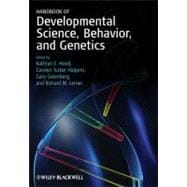
Note: Supplemental materials are not guaranteed with Rental or Used book purchases.
Purchase Benefits
Looking to rent a book? Rent Handbook of Developmental Science, Behavior, and Genetics [ISBN: 9781405187824] for the semester, quarter, and short term or search our site for other textbooks by Hood, Kathryn E.; Halpern, Carolyn Tucker; Greenberg, Gary; Lerner, Richard M.. Renting a textbook can save you up to 90% from the cost of buying.
Carolyn Tucker Halpern is an associate professor in the Department of Maternal and Child Health at the University of North Carolina at Chapel Hill. Her research focuses on biopsychosocial models of adolescent health and development, and the implications of adolescent experiences for young adult well-being.
Gary Greenberg is Professor Emeritus of Psychology at Wichita State University and Adjunct Professor of Psychology at the University of Illinois - Chicago. He is a comparative psychologist, co-founder of the International Society for Comparative Psychology, and Historian/Archivist of APA’s Division (6) of Behavioral Neuroscience and Comparative Psychology.
Richard M. Lerner is the Bergstrom Chair in Applied Developmental Science within the Eliot-Pearson Department of Child Development and the Director of the Institute for Applied Youth Development, at Tufts University. Lerner is known for his theory of relations between life-span human development and social change, and for his research about the relations between adolescents and their peers, families, schools, and communities.
| Foreword | |
| Gilbert Gottlieb and the Developmental Point of View | |
| Introduction | |
| Developmental Systems, Nature-Nurture, and the Role of Genes in Behavior and Development: On the Legacy of Gilbert Gottlieb | |
| Normally Occurring Environmental and Behavioral Influences on Gene Activity: From Central Dogma to Probabilistic Epigenesis | |
| Theoretical Foundations For The Developmental Study of Behavior and Genetics | |
| Historical and Philosophical Perspectives on Behavioral Genetics and Developmental Science | |
| Development and Evolution Revisited | |
| Probabilistic Epigenesis and Modern Behavioral and Neural Genetics | |
| The Roles of Environment, Experience, and Learning in Behavioral Development | |
| Contemporary Ideas in Physics and Biology in Gottlieb's Psychology | |
| Empirical Studies of Behavioral Development and Genetics | |
| Behavioral Development during the Mother-Young Interaction in Placental Mammals: The Development of Behavior in the Relationship with the Mother | |
| Amniotic Fluid as an Extended Milieu Interieur | |
| Developmental Effects of Selective Breeding for an Infant Trait | |
| Emergence and Constraint in Novel Behavioral Adaptations | |
| Nonhuman Primate Research Contributions to Understanding Genetic and Environmental Influences on Phenotypic Outcomes across Development | |
| Interactive Contributions of Genes and Early Experience to Behavioural Development: Sensitive Periods and Lateralized Brain and Behaviour | |
| Trans-Generational Epigenetic Inheritance | |
| The Significance of Non-Replication of Gene-Phenotype Associations | |
| Canalization and Malleability Reconsidered: The Developmental Basis of Phenotypic Stability and Variability | |
| Applications to Development | |
| Gene-Parenting Interplay in the Development of Infant Emotionality | |
| Genetic Research in Psychiatry and Psychology: A Critical Overview | |
| On the Limits of Standard Quantitative Genetic Modeling of Inter-Individual Variation: Extensions, Ergodic Conditions and a New Genetic Factor Model of Intra-Individual Variation | |
| Songs My Mother Taught Me: Gene-Environment Interactions, Brain Development and the Auditory System: Thoughts on Non-Kin Rejection, Part II | |
| Applications of Developmental Systems Theory to Benefit Human Development: On the Contributions of Gilbert Gottlieb to Individuals, Families, and Communities | |
| Name Index | |
| Subject Index | |
| Table of Contents provided by Publisher. All Rights Reserved. |
The New copy of this book will include any supplemental materials advertised. Please check the title of the book to determine if it should include any access cards, study guides, lab manuals, CDs, etc.
The Used, Rental and eBook copies of this book are not guaranteed to include any supplemental materials. Typically, only the book itself is included. This is true even if the title states it includes any access cards, study guides, lab manuals, CDs, etc.